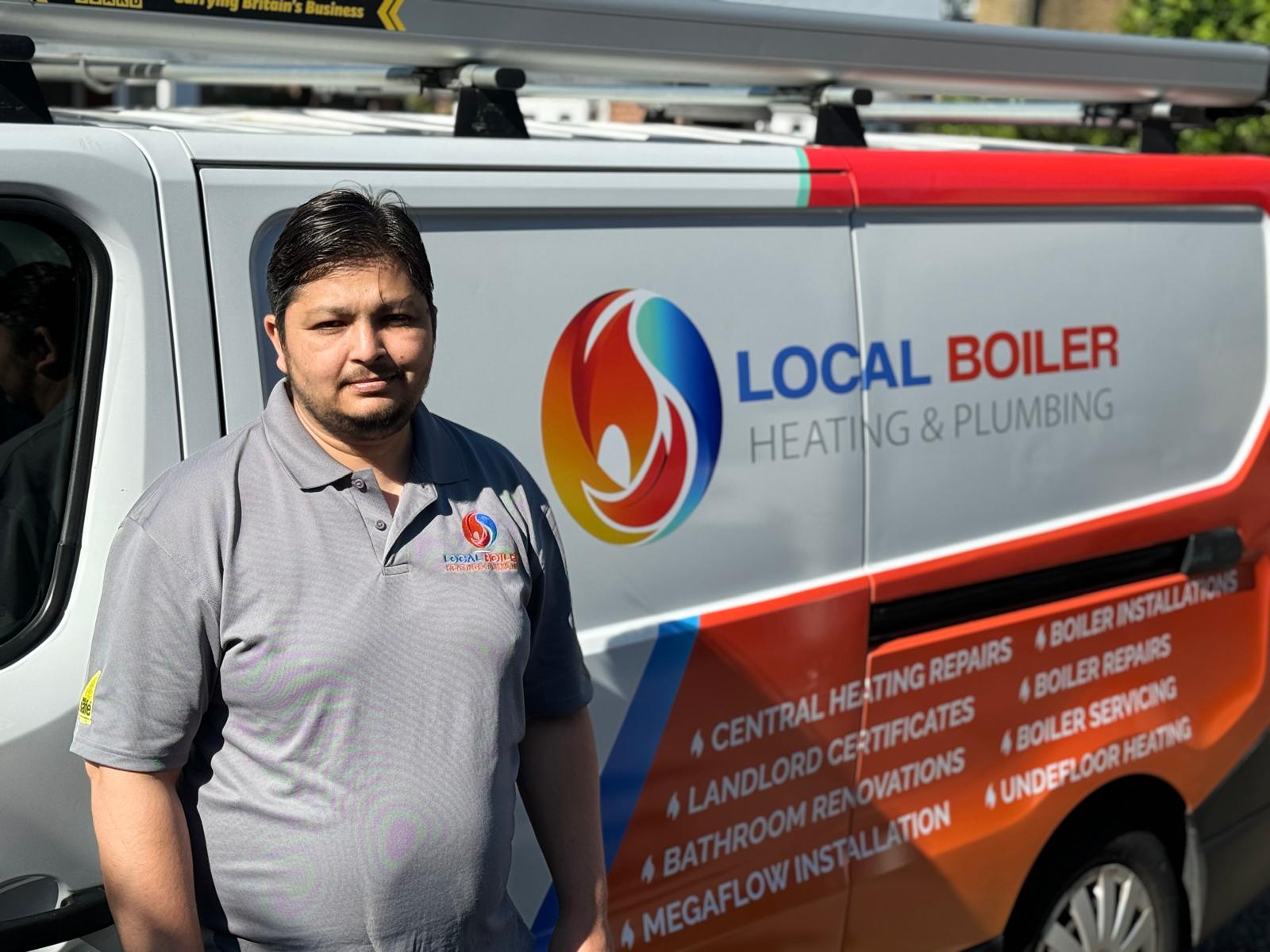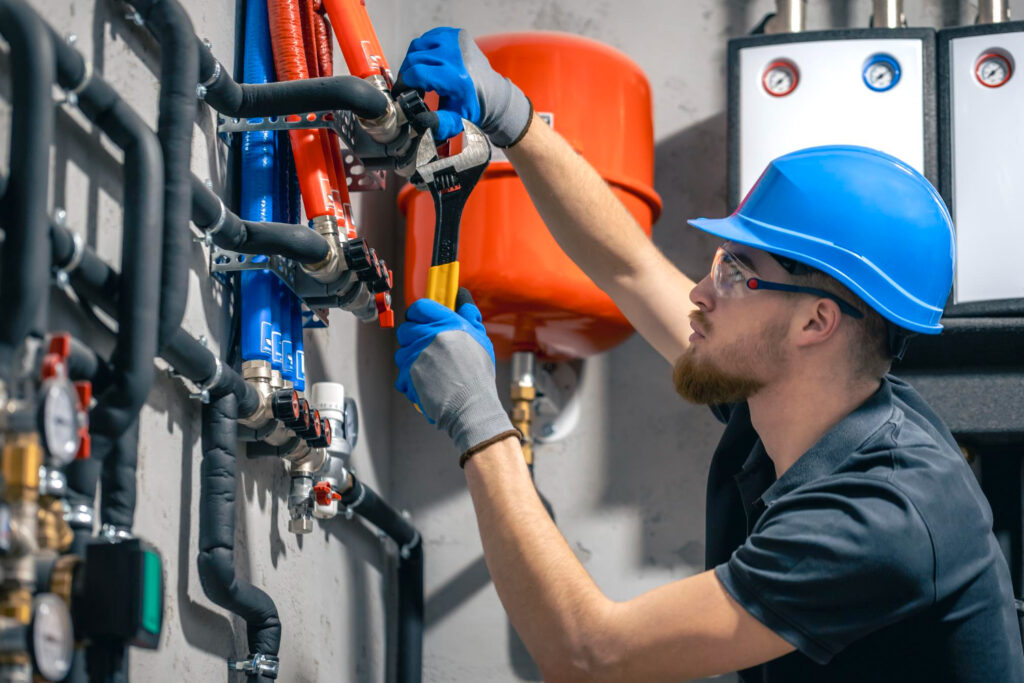Installing Calor gas central heating may be your best option for many reasons if you don’t have access to mains gas in your property. Before you can go about choosing your heating system and look into the different options though, you should get a handle on the installation costs. In this guide, we’re going to run through everything you need to know about Calor gas central heating installation costs in the UK.
Understanding Calor Gas Central Heating Systems
Calor gas central heating is powered by liquefied petroleum gas (LPG) stored in an outside tank or cylinder. It works in the same way as a natural gas central heating system but is fueled from a different source and uses slightly different equipment. A Calor gas heating system will include an LPG boiler, radiators, pipework and controls as well as bulk storage tanks or cylinder storage equipment.
The main benefit of Calor gas central heating is that it can provide heating and hot water for properties that are off the mains gas grid, such as those in rural locations. If you’re interested in installing an LPG-powered system, you might also like to know that it is a cleaner-burning fuel than oil, so LPG central heating is a more environmentally-friendly option.
Modern Calor gas central heating systems provide high levels of efficiency with many rated at 90% or above. This means that more of the fuel you pay for is converted into heat for your home, so you’ll be wasting less energy and have more control over long-term running costs.
Factors Affecting Calor Gas Central Heating Installation Costs
Property Size and Layout
The overall size of your property is one of the most significant factors influencing LPG installation costs. Larger homes not only require more radiators but also need more extensive pipework to distribute heat effectively. This, in turn, often leads to a need for larger boilers capable of heating more substantial areas.
For example, the cost of equipping a three-bedroom house with an LPG heating system will naturally be higher than that for a one-bedroom flat, due to the need for additional radiators and more complex pipework.
The property’s layout also plays a crucial role in determining the installation cost. A home with multiple floors or a complex layout may require more labour hours to install pipework and radiators in hard-to-reach areas, thus increasing the overall project cost.
Boiler Selection and Specifications
LPG boilers come in various sizes and efficiency ratings, with prices varying accordingly. Combination boilers that provide both heating and hot water tend to be more expensive initially but can save space and reduce installation complexity. System boilers require separate hot water cylinders but offer better performance for homes with higher hot water demand.
High-efficiency condensing boilers cost more upfront but deliver better long-term value through reduced fuel consumption. Premium brands with extended warranties and advanced features command higher prices but often provide greater reliability and performance over their operational lifetime.
Storage Options and Requirements
The decision between opting for bulk tank storage or cylinder storage has a significant impact on LPG installation costs. Bulk tanks offer the convenience of larger fuel storage and can potentially reduce the cost per unit of fuel. However, the upfront cost of purchasing a bulk tank is higher than that of cylinder storage. Underground tanks also cost more to install compared to above-ground tanks, primarily due to excavation work and additional safety measures.
Cylinder storage systems generally have lower installation costs but may lead to higher running costs over time. The number of cylinders required will also factor into the overall cost, as it is based on your specific heating requirements and how long you want to go between cylinder changes.
Existing Infrastructure
Properties with existing central heating systems may have lower installation costs if the existing radiators, pipework, and controls can be reused. However, older systems might require upgrades to work efficiently with modern LPG boilers, potentially increasing costs.
New installations in properties without existing central heating require complete system design and installation, including all pipework, radiators, controls, and safety systems. This represents a more substantial investment but provides the opportunity to design an optimal heating system for your specific needs.
Typical Calor Gas Central Heating Installation Costs
Small Properties (1-2 Bedrooms)
For smaller properties, complete Calor gas central heating installation typically costs between £3,500 and £6,000. This includes a compact LPG boiler, basic radiator system, standard controls, and cylinder storage arrangement. Properties requiring minimal pipework and straightforward installations fall towards the lower end of this range.
The boiler itself usually accounts for £1,200 to £2,500 of the total cost, depending on the model and efficiency rating selected. Installation labour typically adds £1,500 to £2,500, while radiators and associated components contribute £800 to £1,000 to the overall project cost.
Medium Properties (3-4 Bedrooms)
Three to four-bedroom properties generally require installation investments between £4,500 and £8,500. These systems need larger boilers, more radiators, and more extensive pipework networks. The increased complexity of designing heating systems for multiple zones and ensuring adequate heat distribution throughout larger floor areas drives costs higher.
Boiler costs for medium properties range from £1,800 to £3,500, while installation labour increases to £2,000 to £3,500 due to the additional time required. Radiator costs typically range from £1,200 to £1,800, with controls and miscellaneous components adding another £500 to £700.
Large Properties (5+ Bedrooms)
Large properties require significant investment in Calor gas central heating systems, with total costs typically ranging from £6,500 to £12,000 or more. These installations often require high-output boilers, extensive radiator networks, sophisticated control systems, and potentially multiple heating zones for optimal comfort and efficiency.
Premium boilers suitable for large properties cost £2,500 to £4,500, while installation labour can reach £3,500 to £5,000 due to the complexity and time requirements. Radiator costs increase substantially to £1,800 to £3,000, and advanced control systems add £800 to £1,200 to the total investment.
Additional Costs to Consider
Gas Storage Installation
Storage costs represent a significant additional expense beyond the heating system itself. Above-ground bulk tanks typically cost £1,500 to £3,000 including installation, while underground tanks can cost £2,500 to £5,000 or more depending on site conditions and tank capacity.
Cylinder storage systems require minimal initial investment but ongoing cylinder rental fees and delivery charges. Many suppliers charge £30 to £50 annually per cylinder for rental, plus delivery fees for each refill service.
Safety and Compliance Requirements
All LPG installations must comply with strict safety regulations, requiring qualified engineers to design and install systems. Safety certificates, building control notifications, and inspection fees typically add £200 to £500 to installation costs.
Properties may require additional safety equipment such as LPG leak detectors, automatic shut-off valves, and specific ventilation arrangements. These safety enhancements generally cost £300 to £800 but are essential for safe operation.
Ongoing Maintenance and Servicing
Annual servicing costs for LPG boilers typically range from £80 to £150, similar to natural gas boilers. However, LPG systems may require additional safety checks and storage system maintenance, potentially adding £50 to £100 annually to maintenance costs.
Extended warranty packages for LPG boilers cost £200 to £400 annually but provide valuable protection against unexpected repair costs and ensure priority servicing when issues arise.
Cost-Saving Strategies for Calor Gas Installation
Timing Your Installation
Installation costs can vary throughout the year, with potential savings available during quieter periods for heating engineers. Summer installations often cost less due to reduced demand, while avoiding peak winter periods can help secure better pricing and faster scheduling.
Planning installations well in advance allows time to obtain multiple quotations and negotiate better terms with suppliers and installers. Rush installations during cold weather typically carry premium pricing due to high demand and urgent scheduling requirements.
Comparing Quotations and Suppliers
Obtaining quotations from multiple suppliers and installers helps ensure competitive pricing and allows comparison of different system designs and specifications. However, the cheapest quotation isn’t always the best value, particularly if it involves lower-quality equipment or less experienced installers.
Consider the total cost of ownership including equipment reliability, warranty terms, ongoing maintenance requirements, and fuel efficiency ratings when comparing options. Premium equipment with better efficiency ratings often provides better long-term value despite higher initial costs.
Government Grants and Incentives
Some government schemes provide financial assistance for heating system upgrades, particularly in rural areas or for energy efficiency improvements. Research available grants and incentives before committing to installation, as these programmes can significantly reduce overall project costs.
Local authorities sometimes offer additional incentives for clean heating technologies, including LPG systems that replace older, less efficient heating methods. Check with your local council about available programmes and eligibility requirements.
Key Benefits of Calor Gas Central Heating
Reliability and Performance
Calor gas systems provide consistent heating performance regardless of external temperatures, unlike some renewable heating technologies that can struggle in extreme weather conditions. The fuel supply remains reliable even during power outages, ensuring continued heating capability when it’s most needed.
Modern LPG boilers offer precise temperature control and rapid heat-up times, providing comfortable living conditions efficiently. The instant availability of hot water from combination boilers eliminates waiting times and provides convenience similar to mains gas systems.
Environmental Considerations
LPG burns cleaner than heating oil, producing lower emissions and contributing less to local air pollution. While not as clean as renewable heating technologies, Calor gas represents a significant improvement over older heating methods in terms of environmental impact.
The efficiency of modern LPG boilers means less fuel consumption for the same heat output, reducing both costs and environmental impact compared to older heating systems. This efficiency also helps properties achieve better Energy Performance Certificate ratings.
Flexibility and Control
Calor gas systems offer excellent control flexibility, with programmable thermostats and zone controls allowing precise temperature management throughout the home. This control capability helps optimize comfort while managing fuel consumption effectively.
The modular nature of LPG systems allows for future expansion or modification as household needs change. Additional radiators or heating zones can be added relatively easily compared to some alternative heating technologies.
Common Installation Challenges and Solutions
Site Access & Planning
- Limited access (narrow lanes, no parking, tough terrain) → needs special tools/labour → higher cost.
- Early planning with the installer avoids surprises.
- Planning rules differ by area. Some tanks need consent.
- Check rules early → avoid delays & extra cost.
Integration with Existing Systems
- Old heating parts (radiators, pipes, controls) may not suit LPG → upgrades add cost.
- Pro system design spots issues early.
- Skilled installers can reuse old parts where possible.
Storage Location & Rules
- LPG tanks must meet safety gaps from buildings, fences, fire risks.
- Space limits can affect tank placement.
- Underground tanks solve space/look issues but need careful planning.
- Site surveys find the best safe & convenient spots.
Maintenance Requirements and Costs
Regular Service
- Boilers need yearly service by Gas Safe LPG engineers.
- Cost: £80–£150 → covers safety, efficiency, upkeep.
- Storage tanks/pipe checks are less often but important.
- Cost: £50–£100 when needed.
Component Replacement & Repairs
- Boilers last 15–20 yrs with care.
- LPG-specific parts may cost more.
- Budget £200–£400 yearly for service & repairs.
Warranty & Insurance
- Extended warranty: £200–£400 yearly → covers repair costs, gives expert service.
- Insurance may need proof of service/inspections.
- Following rules avoids claim issues & may cut premium.
Also Read: Why Is My Boiler Leaking Water From Underneath
How Local Boiler Helps Guide Your Installation Journey
Installing Calor gas central heating can feel complicated, but Local Boiler makes the process simple. With expert knowledge and trusted support, we guide you through every stage of your LPG installation.
- Expert Advice: Our specialists provide clear guidance on choosing the right equipment and understanding installation requirements.
- Simplified Process: We help you navigate planning rules, system options, and compliance with ease.
- Trusted Connections: Local Boiler links you with qualified LPG installers in your area to ensure safe, efficient installation.
- Complete Support: From design and setup to long-term maintenance, we cover every step of the journey.
- Reliable Heating: With our help, you gain a heating system that delivers comfort, safety, and efficiency for years.
Making the Right Decision for Your Property
Choosing Calor gas central heating is an investment that can have a significant impact on your property, from improving comfort levels to potentially increasing its value. While there is an upfront cost to consider, it’s important to plan and budget so that you can get the most out of your new heating system in terms of efficiency and suitability for your home.
Installation costs will vary, but it’s worth remembering that a central heating system is an investment in your home, and will provide years or even decades of reliable, cost-effective heating if maintained properly. So when you’re looking at quotes, think about the long-term value as well as the upfront cost.
These days, a modern LPG (liquefied petroleum gas) system can offer decades of reliable, efficient heating and cooling for a property that isn’t connected to the mains gas supply.
When considering the installation of Calor gas central heating, think about your specific circumstances and requirements. Consider factors such as the size of your property, your heating needs, budget, and long-term plans for the property. Your qualified installer will be able to advise you on the best options for your situation.
By understanding the costs involved and planning your installation carefully, you can enjoy the benefits of modern central heating regardless of your property’s location or mains gas availability. The investment in professional installation and quality equipment pays dividends through reliable operation, lower maintenance costs, and improved energy efficiency over the system’s operational lifetime.

Sunny Saini is a certified heating engineer with over 15 years of experience in maintaining and repairing boilers. He specializes in diagnosing complex boiler issues and providing reliable solutions to ensure homeowners stay warm and comfortable throughout the year.





![]=](https://localboiler.co.uk/wp-content/uploads/2024/05/Untitled-design-96-300x300.jpg)